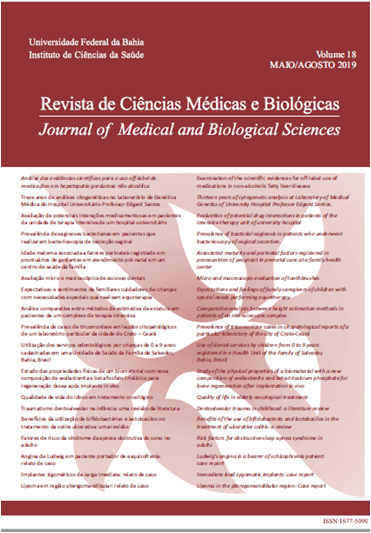Examination of the scientific evidences for off-label use of medications in non-alcoholic fatty liver disease
DOI:
https://doi.org/10.9771/cmbio.v18i2.25909Palabras clave:
Off-label use. Fatty Liver. Drug Therapy. Non-Alcoholic Fatty Liver Disease.Resumen
Introduction: non-alcoholic fatty liver disease (NAFLD) is considered to be a representation in the liver of insulin resistance or metabolic
syndrome, and is a common cause of chronic hepatitis, which can lead to cirrhosis and hepatocellular carcinoma. Currently, there are no
pharmacologic therapies approved by the U.S. Food and Drug Administration (FDA) and National Health Surveillance Agency of Brazil
(ANVISA) for the NAFLD treatment. Objective: the aim of this study is to assess the evidences for off-label use of medication in NAFLD.
Methodology: a systematic search was made in MEDLINE-PubMed for papers published between January 1990 and December 2017,
addressing the off-label use or unlicensed drugs for NAFLD treatment. An integrative review was conducted and the data analyzed
thematically. Results: of the 3540 studies retrieved, 50 met the inclusion criteria by to contain information about the off-label prescriptions
in NAFLD. In this integrative review of the published literature, off-label treatment of NAFLD was generally associated with good shortterm
and long term outcomes. Conclusions: after analyzing the data, may conclude that literature includes studies that provides scientific
evidence for the off-label drugs use in NAFLD. The evidence of the evaluated studies, suggest that metformin treatment has best effect
on reducing hepatocyte fat deposition with regard to other drugs evaluated. However, randomized, placebo controlled studies should
be performed to confirm this evidence.
Descargas
Descargas
Publicado
Cómo citar
Número
Sección
Licencia
A Revista de Ciências Médicas e Biológicas reserva-se todos os direitos autorais dos trabalhos publicados, inclusive de tradução, permitindo, entretanto, a sua posterior reprodução como transcrição, com a devida citação de fonte. O periódico tem acesso livre e gratuito.






